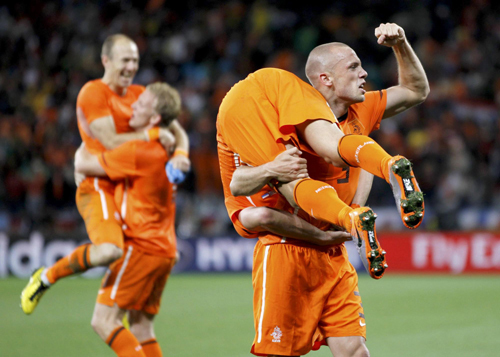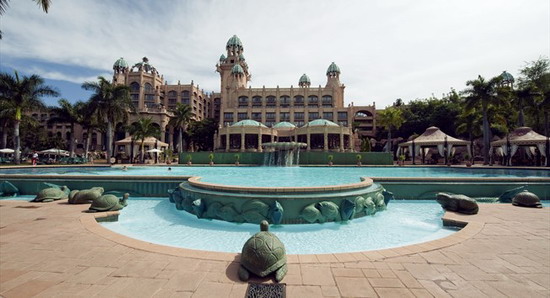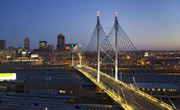

 |
|
Netherlands' John Heitinga (R) celebrates with Wesley Sneijder, Arjen Robben (L) and Dirk Kuyt (2nd L) after their 2010 World Cup semi-final soccer match against Uruguay at Green Point stadium in Cape Town July 6, 2010. [Agencies] |
CAPE TOWN, South Africa?- The World Cup champions will be European. Either Dutch, Spanish or German, to be precise.
Hang on a second, the old continent hogging the summit of world football, haven't we seen that before?
Well, yes. Four years ago, in fact. Remember Italy winning and the head-butt that rocked the world by French captain Zinedine Zidane?
Africa proved at this World Cup that it is more than capable of hosting the biggest single event in sport but that it also is nowhere close to winning it. Ghana was the only country to make a real impression and even it got no further than the quarterfinals. Africa has fine players, competing across Europe in some of the biggest clubs. It also has passion, as evidenced by the way the continent swung behind the Ghanaians after the other five African sides failed to get out of the group stage. But Africa doesn't have the decades of experience, the coaching expertise, and the wealth that make Europe's giants so strong.
For a while at this World Cup of relatively few goals but also genuine upsets, South America strung us along with the illusion that it would be a dominant force. But that, too, wasn't to be. Four of the eight quarterfinalists were South American. None will be in the final. Thank you, Brazil, for letting someone else win for a change. The five-time champions were nowhere near their dancing, awesome best in South Africa. The Brazilians are organizing the next World Cup in 2014 and must regroup, perhaps unearth a new Pele if possible, if they want to win it and add a sixth gold star to their bright yellow jerseys.
Thanks, too, to Argentina for a bundle of goals and for lighting up the World Cup with the passion and quirkiness of Diego Maradona, Argentina's greatest player who discovered that coaching wasn't as easy as he used to make scoring seem. His philosophy of swashbuckling attacking football was the necessary antidote to the dull defensive fare served by teams so unambitious that we've already forgotten who there were. Switzerland, Algeria, any others?
And gracias Uruguay, for giving the World Cup its pantomime villain, Luis Suarez. At the very end of an absorbing quarterfinal, he illegally used his hands to block what would have been a match-winning goal for Ghana. But that cheat also proved to be a Pyrrhic victory for Uruguay. As punishment, football's governing body FIFA made him sit out Tuesday's semifinal against the Netherlands at Cape Town's ghostly white and brand new Green Point Stadium. Deprived of Suarez's goal-scoring talents, Uruguay never looked likely to win. There was a measure of poetic justice for Ghana and Africa in the scoreline?- Netherlands 3 Uruguay 2.
The Dutch captain, Giovanni van Bronckhorst, lit up the match with a moment of beauty. His goal after 18 minutes of constricted and flat football?- neither side wanted to make a mistake in a game of such importance?- whooshed into the top corner of Uruguay's net. He thwacked the ball from 36 meters (yards) out, top speed: 109 kilometers (67 miles) per hour.
So often at this World Cup similar shots have zoomed frustratingly over the crossbar. Players have blamed their lack of control on the Jabulani ball, said by some to be too fast and too light, and the high altitude of some of the stadiums, where shots cut quicker through the thin air. Maybe Cape Town's muggy, denser sea air was a factor in van Bronckhorst finding the back of the net so sweetly against Uruguay. Of all the goals at this World Cup, only the very first of the tournament was better. Siphiwe Tshabalala's shot on the run for South Africa was both athletic and the perfect start.
The Netherlands will play either Spain or the most impressive side of the tournament, Germany, in Sunday's final at the cooking pot-shaped Soccer City stadium in Johannesburg.
Germany's young side has played with such verve and teamwork that it is the favorite. But Spain is the European champion and, unlike three-time world champion Germany, has never won a World Cup. Its talented team of players, many of them from Spanish club Barcelona, has not been as impressive as was expected, but could make amends now when it counts.
Football art for art's sake, the Dutch have been there, done that. Total football, they called it. Got them a place in the sport's history books, but it left their trophy cabinet practically bare.
Now the Dutch are happy to just win, thank you. They have reached the final playing not the prettiest football but perhaps the most pragmatic. Defend well. Score goals. They have won all six of their matches in South Africa. Like the Spanish, they have yet to win a World Cup.
And no European side has ever won the cup outside of Europe. That will change Sunday.
So it's not all same old, same old, after all.

